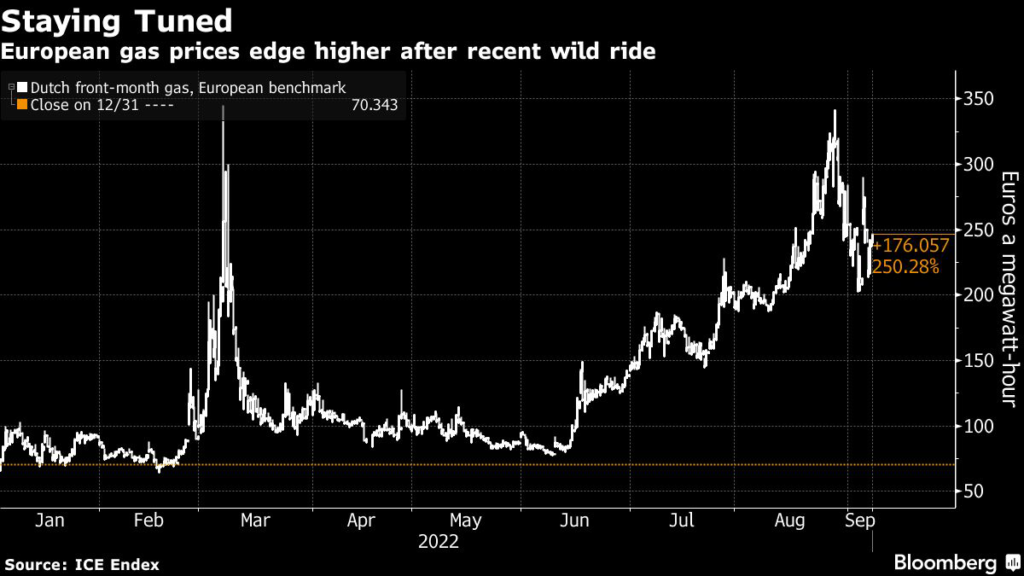Policymakers are pulling together proposals to bring to a meeting of energy ministers in Brussels on Friday where emergency interventions will be hammered out to try to stem surging prices for power and natural gas.
(Bloomberg) — Policymakers are pulling together proposals to bring to a meeting of energy ministers in Brussels on Friday where emergency interventions will be hammered out to try to stem surging prices for power and natural gas.
There is even more urgency to take action with prices edging higher after Russia last week halted gas supplies on the Nord Stream pipeline indefinitely.
Proposed EU measures expected include removing gas from other power generation in the way electricity is priced. Windfall taxes on excess profits may also be introduced to pay for help for households with ballooning costs, rising inflation and a region-wide recession.
Energy traders are also increasingly worried that the crisis may last for years.
Key Developments:
- European Gas Edges Higher Amid Russia Risks, Anti-Crisis Moves
- Europe’s Top Aluminum Plant Will Cut Output 22% on Energy Costs
- Australia Moves to Allay Japan’s Fear It Will Cut Gas Supply
Netherlands Reaches EU Gas Storage Target Early (7:44 a.m.)
The Dutch government confirmed on Wednesday that the country’s gas storage facilities are on average 80% full, nearly two months before the EU deadline.
The cabinet had previously allocated an addition 10 million euros ($9.9 million) to fill the large Bergermeer gas storage facility as much as possible over the previous 68% target. Levels are expected to reach around 90%.
Facilities at Grijpskerk and Alkmaar will be filled to full capacity and the Norg storage facility has now been filled to about 85%.
“We will continue to fill the gas storage facilities in the Netherlands in the coming period so that we have a buffer for the uncertain times that Europe is facing,” said Climate and Energy Minister Rob Jetten.
Gas Prices Move Higher After Recent Wild Ride (7:33 a.m.)
Gas futures in Europe edged higher early Wednesday after wild moves in the previous two days.
Dutch front-month contract, the European benchmark, added 2.7%, with traders weighing risks to Russian supplies against moves drafted by politicians to fix the crisis ahead of winter. Gas supplies from Norway are also curbed due to seasonal maintenance, with volumes bottoming out at the lowest since mid-July on Wednesday.
Works will wrap up next month.
Germany Seen Sliding Into Recession (7:33 a.m.)
For Germany’s industrial backbone, small and medium-sized enterprises, higher energy prices look like a “ticking time bomb”, according to according to ING Groep NV.
With ongoing pressure on consumers’ disposable incomes, companies’ pricing power is fading, Carsten Brzeski, chief macro-economist said.
“Judging from the first macro data for the third quarter, the German economy has not fallen off a cliff at the start of the third quarter but is rather sliding into recession,” he said.
Australia Moves to Allay Japan’s Gas Cut Fears (7:33 a.m.)
Australia says it’s doing what it can to ensure supplies of liquefied natural gas to Asian customers will remain reliable, in response to concerns producers could be forced to redirect to relieve domestic shortfalls.
The nation, which vies with Qatar for the title of top LNG exporter, has the power to force producers in the east to redirect uncontracted cargoes tipped for international markets for domestic consumption, but has so far declined to use it.
Even if Canberra decides to tighten the rules when the current agreement expires on Jan. 1, the impacted volumes are likely to be relatively minor — about 4% of Australia’s exports, according to BloombergNEF.
Crisis May Extend Beyond Next Winter (7 am)
Europe could face an even bigger problem next winter with no end in sight for the energy crisis, Niek Den Hollander, Uniper’s Chief Commercial Officer, said in an interview in Milan.
If Russian gas flows remain curtailed, it’s possible that nations won’t be able to fill up storage sites effectively next summer, he said.
“We could see low inventories in the end of this winter, and that would make it very difficult to procure gas and fill up storage again for security of supply next winter,” Den Hollander said.
“It all depends on how much LNG Europe will be able to attract and will also depend very much on the weather.”
More stories like this are available on bloomberg.com
©2022 Bloomberg L.P.











